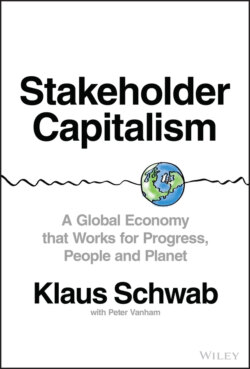Читать книгу Stakeholder Capitalism - Klaus Schwab - Страница 10
1 75 Years of Global Growth and Development
ОглавлениеIn the 75 years since the end of World War II, there has been a surge of global economic development. But despite this, the world is living a tale of two realities.
On the one hand, we have rarely been as well off as we are today. We live in a time of relative peace and absolute wealth. Compared with previous generations, many of us live long and mostly healthy lives. Our children get to go to school, even often college, and computers, smartphones, and other tech devices connect us to the world. Even a generation or two ago, our parents and grandparents could only dream of the lifestyle many of us have today and the luxuries that come with abundant energy, advances in technology, and global trade.
On the other hand, our world and civil society are plagued by maddening inequality and dangerous unsustainability. The COVID-19 public health crisis is just one event that demonstrates that not everyone gets the same chances in life. Those with more money, better connections, or more impressive ZIP codes were affected by COVID at far lower rates; they were more likely to be able to work from home, leave densely populated areas, and get better medical care if they did get infected. This is a continuation of a pattern that has become all too familiar in many societies. The poor are consistently affected by global crises, while the wealthy can easily weather the storm.
To understand how we got here—and how we can get out of this situation—we must go back in time, to the origins of our global economic system. We must play back the picture of post-war economic development and look at its milestones. The logical starting point for this is “Year Zero” for the modern world economy: 1945. And there is perhaps no better place from where to tell this story than Germany, for which that year was truly a new beginning.
